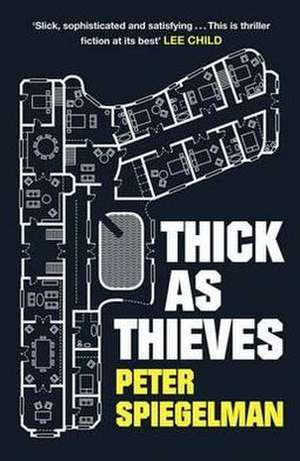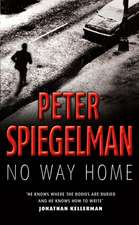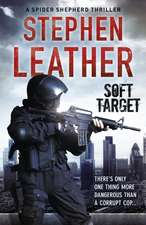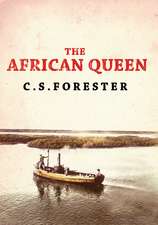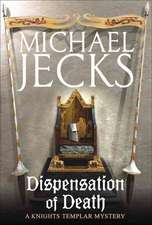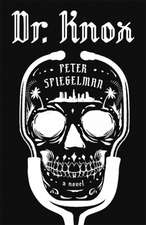Thick as Thieves
Autor Peter Spiegelmanen Limba Engleză Paperback – 2 feb 2012
Preț: 41.67 lei
Preț vechi: 52.50 lei
-21% Nou
Puncte Express: 63
Preț estimativ în valută:
7.97€ • 8.27$ • 6.67£
7.97€ • 8.27$ • 6.67£
Carte indisponibilă temporar
Doresc să fiu notificat când acest titlu va fi disponibil:
Se trimite...
Preluare comenzi: 021 569.72.76
Specificații
ISBN-13: 9780857388445
ISBN-10: 0857388444
Pagini: 488
Dimensiuni: 131 x 197 x 32 mm
Greutate: 0.33 kg
Editura: Quercus Books
ISBN-10: 0857388444
Pagini: 488
Dimensiuni: 131 x 197 x 32 mm
Greutate: 0.33 kg
Editura: Quercus Books
Recenzii
'Pure delight ... Heists, money-laundering and smart plotting ... It doesn't get any better than this' Jeffery Deaver. 'Slick, sophisticated and satisfying ... this is thriller fiction at its best' Lee Child. 'One hell of a thriller ... The big-budget adaptation cannot be far away' Daily Express. 'An ingeniously crafted and beautifully paced thriller that carries the reader along on a tsunami of adrenaline' Irish Independent. 'Fast paced, convincing and clever, this is a very superior thriller' Mail on Sunday. 'The sinister world of criminal 'black money' and the clandestine laundering carried out at law-proof banking havens around the world are at the centre of Peter Spiegelman's involving new crime novel' Good Book Guide.
Notă biografică
Peter Spiegelman is the author of Black Maps, which won the 2004 Shamus Award for Best First P.I. Novel, Death’s Little Helpers, and Red Cat. Prior to becoming a full-time writer, Mr. Spiegelman spent nearly twenty years in the financial services and software industries, and worked with leading banks and brokerages around the world. He lives in Connecticut.
Extras
1
Inside the house now, the three of them stand still in the foyer, in the pale oblong of streetlight that falls through the transom, and Carr hears voices in the walls. A muted cough from the air ducts, a nervous murmur from the drapes, a creaking sigh from the paneling in the center hall-a muffled chorus, singing only to him. Home early. Not the maid's night off. Tires in the driveway. Carr's thighs are lead, and a clamp wraps around his chest. Adrenaline, he knows, but knowing doesn't help. He reminds himself to inhale, to exhale, not too fast. Above his chanting fear he can hear Declan's voice.
"Nothin' like a house in the dark, lad." The brogue that came and went, the rough laughter, the sharper edge of excitement, as if he were talking about a roller coaster. But Carr hates roller coasters, and always has. Inhale, exhale, not too fast.
The odors of the house come to him: lavender, cinnamon, lilac, vanilla, the chemical tang of a disinfectant-like a brothel above a bakery-but Piney Point Village is hardly that kind of Houston neighborhood. He takes another breath and catches a trace of cigars and of dog-an overweight, arthritic Lab that Carr knows is boarded at the vet's all week. Bobby flicks a penlight and follows its beam to a plastic box on the wall.
"No mess," Carr tells him.
"Yeah, yeah, I hear you," Bobby says, irritation and Brooklyn plain in his raspy whisper. He sticks the penlight in his mouth, pops the cover off the box with a thin screwdriver, and pries loose a circuit board from the bracket underneath. He pulls a coil of wire from the wall behind it and picks delicately at the board, teasing up the contacts. Bobby's moves are quick, and there's time to spare when he reaches into his pocket, pulls out something like a matchbook, and snaps it onto one edge of the board. A green LED blinks fast on the matchbook as it talks to the processor in the basement. Don't worry, be happy. The blinking is replaced by a steady glow, and Bobby lets the board hang by its wires down along the wall. He hooks the plastic cover on a corner of the bracket and takes the penlight from his mouth.
"Clean enough?" he asks.
Latin Mike answers. "Slick, cabrón, like always." Mike is forty, older than Carr, older than any of them, but his rounded San Diego accent makes him sound like a kid.
Carr nods. "Bobby goes downstairs; start by the door to the garage. Mike takes the master. Check your headsets first." Carr touches his own and swings down the mic on its wire arm. "You there, Vee?"
In the darkness Valerie's voice is close, as if her lips are at his ear. "Where else?" she says. Her tone is amber, smoky, a little weary. Carr can almost feel her breath. "All quiet out front. A guy walking a dog at the corner; a drunk in a beemer."
"And in back?" Carr asks.
Dennis answers. "Not even a drunk back here." His voice is young and reedy and tentative, like Dennis himself.
Carr looks at Bobby and Latin Mike. "You guys hear everything?" Bobby barely nods; Mike won't muster even that. Carr looks down. "Clean shoes?"
Latin Mike snorts. "We virgins now, jefe?" he says, the jefe laden with sarcasm. "We never done this before?" He walks off, into the deeper darkness of the house, and Bobby follows.
Carr takes a long breath and lets it out slowly. He strains to hear them rummaging upstairs and down, but they're silent. No, not virgins. There's a half-moon table in the foyer, black lacquer with a vase of drooping gladiolas on top and a drawer beneath. Carr thumbs his own penlight and opens it.
Carr has progressed to the office, a mahogany annex to the living room, with many bookshelves but few books. There's a claw-footed desk squatting in the middle, and he's going through the center drawer when Latin Mike's voice crackles in his ear. "Got a box in the master, in the walk-in, behind the suits. Looks like a real piece of shit."
A surge of anger runs through Carr's gut. "Leave it," he says.
"Five minutes max and I'm in this thing."
"I said leave it."
"It's low-hanging fruit, jefe."
"We're not here for fruit. Now stay off the air unless you find it."
If Mike has an answer Carr doesn't hear it over Bobby's laugh. "You want low fruit, bro, you should see the liquor store goin' on down here. We lift a case of Dom, he'd never miss it."
Carr grits his teeth. There'd been none of this bullshit with Declan. With Deke, once they were inside, it was all business. There was no idle chatter, just that gravelly brogue calling out the numbers, and the clipped, whispered acknowledgments from each of them. Carr knows that Mike and Bobby are fucking with him, trying to get a rise, but he's not going to give them the pleasure. He takes a breath and is about to speak when Valerie cuts through Bobby's chuckles. "You girls want to shut the fuck up while this cruiser passes by?" she whispers.
Mike and Bobby go silent and there's a chunk of ice in Carr's gut. He kills his penlight. Valerie's voice is a low monotone. "Half a block down . . . two houses now . . . goddamn it, he's slowing down. Fuck-is there a backup you guys forgot about? 'Cause he's stopped right in front." Her voice gets softer and the sound of rustling fabric is loud in Carr's ear. He can picture her slouching low behind the wheel.
Bobby starts to talk but Carr cuts him off. "Quiet!" he whispers, and then to Valerie: "We burned or what, Vee?"
"I don't know," she whispers. "I don't . . . wait--he's rolling away. One house down . . . now two. He's at the corner, taking . . . a left."
Something releases in Carr's chest. "Dennis, anything?"
"He just went past. He's hanging a right on Smithdale."
Carr flicks on his light again. Bobby's voice leaps into his ear. "I didn't forget a fuckin' thing, Vee."
"You forgot how to keep quiet," Valerie says, the tension in her voice replaced by anger. "You forgot how to keep your head in the game-you and Mike both."
"Don't drag me into this, chica."
"Then shut the fuck up, the both of you, and get back to work."
It's ten minutes later when Bobby calls in. "I got it. On a table at the top of the basement stairs, in a bowl with loose change and gas receipts." Thirty seconds after that, the three of them are in the foyer again.
"Everything buttoned up?" Carr asks.
"Shipshape, jefe."
"Bobby?"
"Gotta clean this up," he says, pushing his chin at the box dangling down the wall. He hands Carr the card he's holding and digs in his vest for the screwdriver.
Carr runs his light over the ID card-hard gray plastic, with a picture of an office building on one side and a red nylon lanyard clipped to one end. He turns the card over and looks at the bar codes and mag strip and photo of the bland, balding man in the center. It's a better picture of Jerry Molloy, he thinks, than the portrait above the living room mantel.
2
There are candles burning in green glass spheres, and green paper lanterns hanging, and the air above the patio is tinted the color of an aquarium gone bad. It smells of citronella, and cigarettes, and a hundred clashing colognes. Valerie walks from the bar, a pitcher of Shiner Bock in each hand. She wears a short, flowered dress that clings to her as if it's wet, and her bare arms and legs are gleaming. Her dark blond hair is pinned in a haphazard pile, and her long, limber body is like a burning fuse as she twists through the crowd.
Every eye in the place-male and female-follows her back to the table, though Carr tries to avoid watching. Looking is what she wants, he thinks, and it feels too much like strings being pulled. Still, over the top of his glass, he looks-and so do Bobby, Latin Mike, and Dennis. Because, despite how long they've known her, how many times they've seen her work a room, there is always with Valerie the promise of something they haven't seen before.
Their table is in a far corner, and the four men sit with their backs to the low cinder-block wall that separates the patio from the surrounding hardpan lot. Carr watches the crowd, which is watching them, and he doesn't care for the attention. Valerie slides the pitchers into the center of the table and sits next to Carr. "What's your problem?" she asks.
"You riled up the natives, chica," Mike answers, before Carr can speak.
"Place needs something," Valerie says. "The music sucks." She's smiling and her cheeks are flushed.
"He don't want them noticing us, right, jefe?"
Carr leans back and looks up through the rafters and the open roof-at the hovering mosquitoes, the flickering bats, the washed-out stars above. A warm breeze works its fingers beneath his shirt. He's had three beers, and there's a pleasant foaminess somewhere around his forebrain. He knows where Mike is going and he's too tired to follow. He keeps quiet but it doesn't help.
"Like they took us for locals before she crossed the floor?" Bobby says.
Mike gives Bobby a low five. "We blend in, cabrón; we natives." Latin Mike looks at Carr and frowns. "They get a bad vibe from us, jefe."
Carr drains his beer glass. "Vibes are one thing; Vee makes us memorable."
"Memorable for sure," Bobby says, and winks at Valerie, who winks back.
Mike snorts. "Face it, pendejo, we fit better in Caracas or Recife than we do up here."
Dennis wipes sweat from his face and joins in. "Down there we're just norteamericanos--oil workers, contractors, whatever--nobody gives a damn. Just a few more Yankees passing through."
"Speak for yourself, yanqui," Mike says. "But the point is, what the fuck we doing up here? Too much homeland security horseshit-what we need the headaches for? It's not like we have problems finding work."
Carr sighs. "Not this kind of work."
Mike downs half his beer and points a finger at Carr. He's smiling, but with him that's a tactic. "This kind of work is too fucking complicated-too many moving parts."
"You used to worry about the same shit five years ago, if I remember right, but things turned out okay."
"Damn straight I was worried. We had a good thing going, fishing where the fish were stupid-why mess with what works? But Deke was a man with a plan, and there was no arguing with him. Plus, I had faith in the guy."
"And you don't in me."
"No offense, cabrón, but you're not Deke."
Carr leans forward. "Sure, Mike, no offense."
"For chrissakes!" Valerie says, and slams her own glass on the tabletop. "Why don't you two get a room if you're going at this bullshit again. This was supposed to be a party." Bobby smirks and Dennis giggles with relief. Under the table Valerie's hand finds Carr's thigh. He doesn't jump, but it's a near thing. Her palm is hot through the fabric of his jeans. Carr nods slowly and reaches for a pitcher. He proffers it across the table.
"Let me top that off," he says, and Mike holds out his glass.
Valerie is right, Carr knows: they've gone around like this a dozen times or more, and there'll be time enough to go around again. But not now. Now, the night before they work again, it's time to drink. It's a lesson he had from Declan, who was ever alert to the peril of idle hands.
"Busy is best for these nippers," he'd told Carr. "Otherwise it's all worry and gossip and chewin' the arses off one another. Keep 'em busy, and when they've done their chores, get 'em pissed." More than tradition, these outings are an antidote to the jitters and jumps and sheer stir-craziness that come to a boil on the eve of every job. But like so much else he's learned from Declan, Carr knows he doesn't do it quite as well. Pirate king, father confessor, jolly Jack Falstaff- Carr is none of these, though he has developed other talents: watchfulness, patience, an attention to detail-the talents of a planner, a technician. Not exactly inspirational, he knows. Not like Declan. Still, one does what one can.
Carr works a smile onto his face and fills glasses until the pitcher is empty. Valerie's hand is gone now, and the music is louder, if unimproved. Valerie is dancing with Mike to something twangy, and Dennis watches them, tapping the tabletop in time to nothing Carr can hear. Bobby is eyeing the local talent. The peaceable kingdom. Carr finishes his beer. He leans back and looks at the wrung-out sky and thinks of limes.
Declan was cutting them the first time they met-a bet with a barman at a marble and frosted glass palace in Las Lomas. Teddy Voigt, Carr's immediate boss at Integral Risk Associates, and the closest thing he'd had to a friend there, had arranged the get-together, not forty-eight hours after Carr had been fired and just forty-eight hours before Carr had to vacate his company-owned apartment-the graceful exit being one of the things Carr had relinquished when he'd hit his most profitable client in the face.
Hunched over the granite bar, Declan was a rhino at a tea party: red- faced, craggy, and ancient next to the silken youth that crowded the club-more like one of the bodyguards loitering on the sidewalk outside. The paring knife was nearly lost in his fist, but the edge of the blade was a blur and the slices he cut were translucent green petals. Whatever the bet was, Declan won going away, and whatever the prize, Declan declined payment and instead bought the barman a shot of Patrón. Which, Carr came to realize, was essential Declan: good with bartenders, good with knives, good with tactical mercy.
Good at other things too, Carr learned as they bar-hopped across the leafy night, from Las Lomas to an En?glish pub in Polanco to a hipster saloon in Condesa. Good at Gallic bonhomie and fatalistic, self- deprecating humor. Good at oblique but relentless interrogation. Good at large volumes of pricey tequila, chased by even larger volumes of beer. Good, despite how much he'd had to drink, at negotiating the unforgiving chaos of traffic in Mexico City.
Good too at throwing an elbow into a man's windpipe, then breaking his wrist, for slapping a woman to the pavement. That took place in the doorway of their last stop: a workingman's tavern in Santa María la Ri? bera that was little more than a dim hallway drenched in nicotine and sentimental guitars. The patrons seemed to take the violence in stride, if they noticed it at all, and the smile never left Declan's face. He'd made his pitch to Carr at a table near the kitchen.
Carr comes back to the sound of breaking glass. Dennis and Valerie are on the dance floor but they're not dancing. There's a stunned look on Dennis's face, and a local boy, a wide receiver gone to seed, is laughing and grabbing Valerie around the waist. Latin Mike and Bobby are on their feet, smiling eagerly as three doughy cowboys shoulder through the skittish crowd to help the wide receiver. Valerie looks angry, and looks at Carr, who has visions of broken bottles, flashing lights, the cowboys hauled off in ambulances, his crew simply hauled off.
"Shit," he mutters, and hoists himself off his chair.
In the Ford, on the way back to the hotel, adrenaline has burned off the alcohol and left them with a different kind of buzz. Carr is at the wheel, always three miles over the limit, nice and steady, while Valerie works the radio. Dennis has his face in the rush of humid air from the open window in back, and Bobby and Mike are smoking and joking.
"Fucking Vee," Bobby says, "that guy's gonna be picking his balls outta his nose for a week." He puts a fist forward and Valerie knocks it with her own.
"The way he mauled me, I should've kicked him again."
Mike catches Carr's eye in the mirror. "Three times was enough, chica," he says. "Four would make you memorable." He and Bobby laugh and Carr shakes his head and pulls into the hotel lot.
Dennis is pale and wobbly getting out of the car; he crosses the parking lot at a jog and disappears into the hotel. Valerie, Bobby, and Mike take their time. Mike lights another cigarette, props his elbows on the Ford’s roof, and looks across at Carr.
“Eight o’clock tomorrow,” Carr says. Mike and Valerie say nothing. Bobby looks at the low hotel, the rows of windows, mostly black, and the vestigial balconies. He nods absently and heads for the lobby. Carr follows, rubbing the bruises on his forearms and knuckles, not listening to Mike and Valerie, who stand by the car and speak softly.
Carr leaves his room dark and lets his eyes adjust to the yellow haze that seeps through the curtains from the sodium lamps outside. From the window he can see the parking lot and, if he cranes his neck, the car. He can make out Latin Mike’s shape, tall, with a plume of cigarette smoke above, and Valerie’s silhouette, very close by. Just how close? Carr can’t tell from his vantage, and in a while he tells himself he doesn’t care. A while after that he stops looking.
The air in his room is like an airplane’s: metallic, exhausted, and too cold. Carr switches off the AC, and a ticking silence descends. And then dissolves in the babble of a television from next door. Carr switches on the AC.
His work clothes hang in the closet, and his bag is packed but for his shaving kit and what he’s wearing. He strips off his jeans and polo shirt, folds them, packs them away, and looks around the room, rehearsing in his mind the routine for wiping it down: front to back, left to right, floor to head height. Then he brushes his teeth and gets into the shower.
When he comes out, Valerie’s key is on the desk. Her shoes are by the nightstand, her dress on the chair, and Valerie herself is in bed, under a sheet, with a hand behind her head and her blond hair fanned across thepillows. Carr can smell her perfume and her sweat, and the cigarette smoke that clings to her like cobwebs. Just how close?
“Is he going to behave himself?” Carr asks.
“He’ll behave tomorrow.”
“And after that?”
Valerie shrugs. “You think you can get to sleep?” she asks.
“No,” Carr says, and fastens the chain on the door.
From the Hardcover edition.
Inside the house now, the three of them stand still in the foyer, in the pale oblong of streetlight that falls through the transom, and Carr hears voices in the walls. A muted cough from the air ducts, a nervous murmur from the drapes, a creaking sigh from the paneling in the center hall-a muffled chorus, singing only to him. Home early. Not the maid's night off. Tires in the driveway. Carr's thighs are lead, and a clamp wraps around his chest. Adrenaline, he knows, but knowing doesn't help. He reminds himself to inhale, to exhale, not too fast. Above his chanting fear he can hear Declan's voice.
"Nothin' like a house in the dark, lad." The brogue that came and went, the rough laughter, the sharper edge of excitement, as if he were talking about a roller coaster. But Carr hates roller coasters, and always has. Inhale, exhale, not too fast.
The odors of the house come to him: lavender, cinnamon, lilac, vanilla, the chemical tang of a disinfectant-like a brothel above a bakery-but Piney Point Village is hardly that kind of Houston neighborhood. He takes another breath and catches a trace of cigars and of dog-an overweight, arthritic Lab that Carr knows is boarded at the vet's all week. Bobby flicks a penlight and follows its beam to a plastic box on the wall.
"No mess," Carr tells him.
"Yeah, yeah, I hear you," Bobby says, irritation and Brooklyn plain in his raspy whisper. He sticks the penlight in his mouth, pops the cover off the box with a thin screwdriver, and pries loose a circuit board from the bracket underneath. He pulls a coil of wire from the wall behind it and picks delicately at the board, teasing up the contacts. Bobby's moves are quick, and there's time to spare when he reaches into his pocket, pulls out something like a matchbook, and snaps it onto one edge of the board. A green LED blinks fast on the matchbook as it talks to the processor in the basement. Don't worry, be happy. The blinking is replaced by a steady glow, and Bobby lets the board hang by its wires down along the wall. He hooks the plastic cover on a corner of the bracket and takes the penlight from his mouth.
"Clean enough?" he asks.
Latin Mike answers. "Slick, cabrón, like always." Mike is forty, older than Carr, older than any of them, but his rounded San Diego accent makes him sound like a kid.
Carr nods. "Bobby goes downstairs; start by the door to the garage. Mike takes the master. Check your headsets first." Carr touches his own and swings down the mic on its wire arm. "You there, Vee?"
In the darkness Valerie's voice is close, as if her lips are at his ear. "Where else?" she says. Her tone is amber, smoky, a little weary. Carr can almost feel her breath. "All quiet out front. A guy walking a dog at the corner; a drunk in a beemer."
"And in back?" Carr asks.
Dennis answers. "Not even a drunk back here." His voice is young and reedy and tentative, like Dennis himself.
Carr looks at Bobby and Latin Mike. "You guys hear everything?" Bobby barely nods; Mike won't muster even that. Carr looks down. "Clean shoes?"
Latin Mike snorts. "We virgins now, jefe?" he says, the jefe laden with sarcasm. "We never done this before?" He walks off, into the deeper darkness of the house, and Bobby follows.
Carr takes a long breath and lets it out slowly. He strains to hear them rummaging upstairs and down, but they're silent. No, not virgins. There's a half-moon table in the foyer, black lacquer with a vase of drooping gladiolas on top and a drawer beneath. Carr thumbs his own penlight and opens it.
Carr has progressed to the office, a mahogany annex to the living room, with many bookshelves but few books. There's a claw-footed desk squatting in the middle, and he's going through the center drawer when Latin Mike's voice crackles in his ear. "Got a box in the master, in the walk-in, behind the suits. Looks like a real piece of shit."
A surge of anger runs through Carr's gut. "Leave it," he says.
"Five minutes max and I'm in this thing."
"I said leave it."
"It's low-hanging fruit, jefe."
"We're not here for fruit. Now stay off the air unless you find it."
If Mike has an answer Carr doesn't hear it over Bobby's laugh. "You want low fruit, bro, you should see the liquor store goin' on down here. We lift a case of Dom, he'd never miss it."
Carr grits his teeth. There'd been none of this bullshit with Declan. With Deke, once they were inside, it was all business. There was no idle chatter, just that gravelly brogue calling out the numbers, and the clipped, whispered acknowledgments from each of them. Carr knows that Mike and Bobby are fucking with him, trying to get a rise, but he's not going to give them the pleasure. He takes a breath and is about to speak when Valerie cuts through Bobby's chuckles. "You girls want to shut the fuck up while this cruiser passes by?" she whispers.
Mike and Bobby go silent and there's a chunk of ice in Carr's gut. He kills his penlight. Valerie's voice is a low monotone. "Half a block down . . . two houses now . . . goddamn it, he's slowing down. Fuck-is there a backup you guys forgot about? 'Cause he's stopped right in front." Her voice gets softer and the sound of rustling fabric is loud in Carr's ear. He can picture her slouching low behind the wheel.
Bobby starts to talk but Carr cuts him off. "Quiet!" he whispers, and then to Valerie: "We burned or what, Vee?"
"I don't know," she whispers. "I don't . . . wait--he's rolling away. One house down . . . now two. He's at the corner, taking . . . a left."
Something releases in Carr's chest. "Dennis, anything?"
"He just went past. He's hanging a right on Smithdale."
Carr flicks on his light again. Bobby's voice leaps into his ear. "I didn't forget a fuckin' thing, Vee."
"You forgot how to keep quiet," Valerie says, the tension in her voice replaced by anger. "You forgot how to keep your head in the game-you and Mike both."
"Don't drag me into this, chica."
"Then shut the fuck up, the both of you, and get back to work."
It's ten minutes later when Bobby calls in. "I got it. On a table at the top of the basement stairs, in a bowl with loose change and gas receipts." Thirty seconds after that, the three of them are in the foyer again.
"Everything buttoned up?" Carr asks.
"Shipshape, jefe."
"Bobby?"
"Gotta clean this up," he says, pushing his chin at the box dangling down the wall. He hands Carr the card he's holding and digs in his vest for the screwdriver.
Carr runs his light over the ID card-hard gray plastic, with a picture of an office building on one side and a red nylon lanyard clipped to one end. He turns the card over and looks at the bar codes and mag strip and photo of the bland, balding man in the center. It's a better picture of Jerry Molloy, he thinks, than the portrait above the living room mantel.
2
There are candles burning in green glass spheres, and green paper lanterns hanging, and the air above the patio is tinted the color of an aquarium gone bad. It smells of citronella, and cigarettes, and a hundred clashing colognes. Valerie walks from the bar, a pitcher of Shiner Bock in each hand. She wears a short, flowered dress that clings to her as if it's wet, and her bare arms and legs are gleaming. Her dark blond hair is pinned in a haphazard pile, and her long, limber body is like a burning fuse as she twists through the crowd.
Every eye in the place-male and female-follows her back to the table, though Carr tries to avoid watching. Looking is what she wants, he thinks, and it feels too much like strings being pulled. Still, over the top of his glass, he looks-and so do Bobby, Latin Mike, and Dennis. Because, despite how long they've known her, how many times they've seen her work a room, there is always with Valerie the promise of something they haven't seen before.
Their table is in a far corner, and the four men sit with their backs to the low cinder-block wall that separates the patio from the surrounding hardpan lot. Carr watches the crowd, which is watching them, and he doesn't care for the attention. Valerie slides the pitchers into the center of the table and sits next to Carr. "What's your problem?" she asks.
"You riled up the natives, chica," Mike answers, before Carr can speak.
"Place needs something," Valerie says. "The music sucks." She's smiling and her cheeks are flushed.
"He don't want them noticing us, right, jefe?"
Carr leans back and looks up through the rafters and the open roof-at the hovering mosquitoes, the flickering bats, the washed-out stars above. A warm breeze works its fingers beneath his shirt. He's had three beers, and there's a pleasant foaminess somewhere around his forebrain. He knows where Mike is going and he's too tired to follow. He keeps quiet but it doesn't help.
"Like they took us for locals before she crossed the floor?" Bobby says.
Mike gives Bobby a low five. "We blend in, cabrón; we natives." Latin Mike looks at Carr and frowns. "They get a bad vibe from us, jefe."
Carr drains his beer glass. "Vibes are one thing; Vee makes us memorable."
"Memorable for sure," Bobby says, and winks at Valerie, who winks back.
Mike snorts. "Face it, pendejo, we fit better in Caracas or Recife than we do up here."
Dennis wipes sweat from his face and joins in. "Down there we're just norteamericanos--oil workers, contractors, whatever--nobody gives a damn. Just a few more Yankees passing through."
"Speak for yourself, yanqui," Mike says. "But the point is, what the fuck we doing up here? Too much homeland security horseshit-what we need the headaches for? It's not like we have problems finding work."
Carr sighs. "Not this kind of work."
Mike downs half his beer and points a finger at Carr. He's smiling, but with him that's a tactic. "This kind of work is too fucking complicated-too many moving parts."
"You used to worry about the same shit five years ago, if I remember right, but things turned out okay."
"Damn straight I was worried. We had a good thing going, fishing where the fish were stupid-why mess with what works? But Deke was a man with a plan, and there was no arguing with him. Plus, I had faith in the guy."
"And you don't in me."
"No offense, cabrón, but you're not Deke."
Carr leans forward. "Sure, Mike, no offense."
"For chrissakes!" Valerie says, and slams her own glass on the tabletop. "Why don't you two get a room if you're going at this bullshit again. This was supposed to be a party." Bobby smirks and Dennis giggles with relief. Under the table Valerie's hand finds Carr's thigh. He doesn't jump, but it's a near thing. Her palm is hot through the fabric of his jeans. Carr nods slowly and reaches for a pitcher. He proffers it across the table.
"Let me top that off," he says, and Mike holds out his glass.
Valerie is right, Carr knows: they've gone around like this a dozen times or more, and there'll be time enough to go around again. But not now. Now, the night before they work again, it's time to drink. It's a lesson he had from Declan, who was ever alert to the peril of idle hands.
"Busy is best for these nippers," he'd told Carr. "Otherwise it's all worry and gossip and chewin' the arses off one another. Keep 'em busy, and when they've done their chores, get 'em pissed." More than tradition, these outings are an antidote to the jitters and jumps and sheer stir-craziness that come to a boil on the eve of every job. But like so much else he's learned from Declan, Carr knows he doesn't do it quite as well. Pirate king, father confessor, jolly Jack Falstaff- Carr is none of these, though he has developed other talents: watchfulness, patience, an attention to detail-the talents of a planner, a technician. Not exactly inspirational, he knows. Not like Declan. Still, one does what one can.
Carr works a smile onto his face and fills glasses until the pitcher is empty. Valerie's hand is gone now, and the music is louder, if unimproved. Valerie is dancing with Mike to something twangy, and Dennis watches them, tapping the tabletop in time to nothing Carr can hear. Bobby is eyeing the local talent. The peaceable kingdom. Carr finishes his beer. He leans back and looks at the wrung-out sky and thinks of limes.
Declan was cutting them the first time they met-a bet with a barman at a marble and frosted glass palace in Las Lomas. Teddy Voigt, Carr's immediate boss at Integral Risk Associates, and the closest thing he'd had to a friend there, had arranged the get-together, not forty-eight hours after Carr had been fired and just forty-eight hours before Carr had to vacate his company-owned apartment-the graceful exit being one of the things Carr had relinquished when he'd hit his most profitable client in the face.
Hunched over the granite bar, Declan was a rhino at a tea party: red- faced, craggy, and ancient next to the silken youth that crowded the club-more like one of the bodyguards loitering on the sidewalk outside. The paring knife was nearly lost in his fist, but the edge of the blade was a blur and the slices he cut were translucent green petals. Whatever the bet was, Declan won going away, and whatever the prize, Declan declined payment and instead bought the barman a shot of Patrón. Which, Carr came to realize, was essential Declan: good with bartenders, good with knives, good with tactical mercy.
Good at other things too, Carr learned as they bar-hopped across the leafy night, from Las Lomas to an En?glish pub in Polanco to a hipster saloon in Condesa. Good at Gallic bonhomie and fatalistic, self- deprecating humor. Good at oblique but relentless interrogation. Good at large volumes of pricey tequila, chased by even larger volumes of beer. Good, despite how much he'd had to drink, at negotiating the unforgiving chaos of traffic in Mexico City.
Good too at throwing an elbow into a man's windpipe, then breaking his wrist, for slapping a woman to the pavement. That took place in the doorway of their last stop: a workingman's tavern in Santa María la Ri? bera that was little more than a dim hallway drenched in nicotine and sentimental guitars. The patrons seemed to take the violence in stride, if they noticed it at all, and the smile never left Declan's face. He'd made his pitch to Carr at a table near the kitchen.
Carr comes back to the sound of breaking glass. Dennis and Valerie are on the dance floor but they're not dancing. There's a stunned look on Dennis's face, and a local boy, a wide receiver gone to seed, is laughing and grabbing Valerie around the waist. Latin Mike and Bobby are on their feet, smiling eagerly as three doughy cowboys shoulder through the skittish crowd to help the wide receiver. Valerie looks angry, and looks at Carr, who has visions of broken bottles, flashing lights, the cowboys hauled off in ambulances, his crew simply hauled off.
"Shit," he mutters, and hoists himself off his chair.
In the Ford, on the way back to the hotel, adrenaline has burned off the alcohol and left them with a different kind of buzz. Carr is at the wheel, always three miles over the limit, nice and steady, while Valerie works the radio. Dennis has his face in the rush of humid air from the open window in back, and Bobby and Mike are smoking and joking.
"Fucking Vee," Bobby says, "that guy's gonna be picking his balls outta his nose for a week." He puts a fist forward and Valerie knocks it with her own.
"The way he mauled me, I should've kicked him again."
Mike catches Carr's eye in the mirror. "Three times was enough, chica," he says. "Four would make you memorable." He and Bobby laugh and Carr shakes his head and pulls into the hotel lot.
Dennis is pale and wobbly getting out of the car; he crosses the parking lot at a jog and disappears into the hotel. Valerie, Bobby, and Mike take their time. Mike lights another cigarette, props his elbows on the Ford’s roof, and looks across at Carr.
“Eight o’clock tomorrow,” Carr says. Mike and Valerie say nothing. Bobby looks at the low hotel, the rows of windows, mostly black, and the vestigial balconies. He nods absently and heads for the lobby. Carr follows, rubbing the bruises on his forearms and knuckles, not listening to Mike and Valerie, who stand by the car and speak softly.
Carr leaves his room dark and lets his eyes adjust to the yellow haze that seeps through the curtains from the sodium lamps outside. From the window he can see the parking lot and, if he cranes his neck, the car. He can make out Latin Mike’s shape, tall, with a plume of cigarette smoke above, and Valerie’s silhouette, very close by. Just how close? Carr can’t tell from his vantage, and in a while he tells himself he doesn’t care. A while after that he stops looking.
The air in his room is like an airplane’s: metallic, exhausted, and too cold. Carr switches off the AC, and a ticking silence descends. And then dissolves in the babble of a television from next door. Carr switches on the AC.
His work clothes hang in the closet, and his bag is packed but for his shaving kit and what he’s wearing. He strips off his jeans and polo shirt, folds them, packs them away, and looks around the room, rehearsing in his mind the routine for wiping it down: front to back, left to right, floor to head height. Then he brushes his teeth and gets into the shower.
When he comes out, Valerie’s key is on the desk. Her shoes are by the nightstand, her dress on the chair, and Valerie herself is in bed, under a sheet, with a hand behind her head and her blond hair fanned across thepillows. Carr can smell her perfume and her sweat, and the cigarette smoke that clings to her like cobwebs. Just how close?
“Is he going to behave himself?” Carr asks.
“He’ll behave tomorrow.”
“And after that?”
Valerie shrugs. “You think you can get to sleep?” she asks.
“No,” Carr says, and fastens the chain on the door.
From the Hardcover edition.
